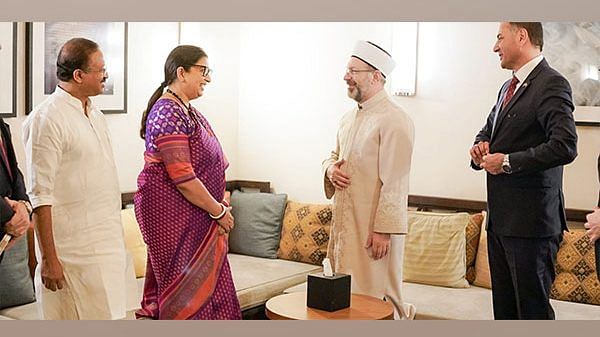Minority affairs minister Smriti Irani’s visit to Saudi Arabia with minister of state for external and parliamentary affairs V Muraleedharan is groundbreaking in several ways. For one, they visited Madinah, which not only marks a pivotal moment in the diplomatic ties between India and Saudi Arabia but also resonates with a myriad of crucial messages.
As an Indian Muslim woman relishing the liberty to choose my attire, whether it’s burqa or jeans, witnessing Irani in Madinah in her cultural attire was profoundly uplifting. It echoed a meaningful celebration of personal choice. Beyond Madinah, her visit extended to the sacred sites of Uhud Mountain and the periphery of Quba Mosque, significant in Islamic history.
This pilgrimage, accompanied by the minister’s presence in her chosen attire, resonates with the transformative winds blowing across Saudi Arabia. Crown Prince Mohammed bin Salman Al Saud’s heroic decisions, going beyond the realms of entertainment, include the lifting of mandatory burqa and granting women the liberty to fashion their attire in accordance with their preferences. The decision allowing women to drive serves as a powerful stride toward gender equality, redefining societal norms. The embrace of co-educational classrooms signifies a departure from austere traditions, emphasising the ever-evolving interpretation shaping the practice of religion.
A crucial takeaway from Irani’s visit resonates deeply with me—the dispelling of extremes from both sides of the spectrum. On the one hand, we witness the discontent among Islamists and traditionalists who vehemently oppose the minister’s visit, deeming it incompatible with their interpretation of Islam. They direct their ire at the Crown Prince, claiming the visit deviates from their understanding of the faith.
Simultaneously, some Hindu nationalists persistently argue that Islam and its followers cannot peacefully coexist with other faiths. This stems from the belief that Islam’s teachings inherently reject the idea of harmonious coexistence. However, this visit challenges these notions.
Also read: Muslim minds, not bodies, are targets of Hindutva vigilantes. Their crimes resemble terrorism
The significance of it
The fact that Irani chose to wear attire representing Hindu culture—such as the bindi and sari—during her visit to Madinah sends a powerful message. It demonstrates a willingness to foster an atmosphere of mutual respect for diverse faiths. Intellectual arguments asserting that Islam cannot coexist peacefully with other faiths are contradicted by this visit, especially given the sacred significance of Madinah to Muslims worldwide.
There are valuable lessons for Indian Muslims here. While many ordinary Indian Muslims already lead lives characterised by shared coexistence, the trend towards radicalisation or an inclination to adopt a more stringent form of Islam, surpassing even Arab Muslims, can generate a sense of repulsion towards people of other faiths. This moment serves as a cue to reconsider such divisive attitudes.
Another profoundly significant and uplifting aspect that emerges for me, particularly as an Indian Pasmanda Muslim, is the augmentation of the Haj quota for Indian Muslims. A pivotal outcome of minister Irani’s diplomatic mission was the formalisation of the Bilateral Haj Agreement 2024 between India and Saudi Arabia. This crucial agreement delineated an increased total quota of 1,75,025 pilgrims from India for the Haj pilgrimage in 2024. Within this allocation, 1,40,020 seats were specifically earmarked for pilgrims under the auspices of the Haj Committee of India, while an additional 35,005 pilgrims were granted permission to proceed through Haj Group Operators.
During her stay, Irani and Muraleedharan took the time to engage with Indian volunteers who played a pivotal role in providing services to their compatriots during Haj 2023. This interaction not only served to acknowledge the dedicated efforts of these volunteers but also provided a platform for understanding the challenges and opportunities in enhancing the overall pilgrimage experience for Indian Haj pilgrims.
This development fills me with gratitude, as it reflects not only the acknowledgment of our spiritual needs but also the nation’s commitment to caring for its second-largest population and minority community. It underscores how, beyond policies, there is a genuine endeavour to ensure the well-being and spiritual fulfilment of Indian Muslims.
Amana Begam Ansari is a columnist, writer, TV News Panelist. She runs a weekly YouTube show called ‘India This Week by Amana and Khalid’. She tweets @Amana_Ansari. Views are personal.
(Edited by Prashant)



